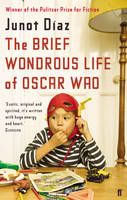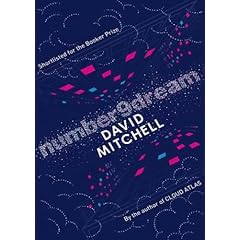 The Brief Wondrous Life Of Oscar Wao won the Pultizer Prize for Fiction in 2008. The protagonist, Oscar, is an overweight American boy (with Dominican roots), who aspires to be the next Tolkien. His interests include writing passionately, role-playing games, comic books, sci-fi and fantasy, and of course, women. However, one bad experience with his first love meant his adolescent nerdliness vaporising any iota of a chance he had for young love. He lives in New Jersey with his demanding difficult-to-please mother, Belicia, and his rebellious punk sister, Lola.
While the protagonist of this book is Oscar, it's narrated by Yunior - Oscar's roommate from college, as well as a love interest of Lola. Also, this is not a book about "the brief wondrous life of Oscar Wao" - instead, it's an epic story of the curse (fukú) that Oscar's family has been subject to, for the past two generations, in the hands of Trujillo, a dictator in the Dominican Republic in the mid-1900s.
The Brief Wondrous Life Of Oscar Wao won the Pultizer Prize for Fiction in 2008. The protagonist, Oscar, is an overweight American boy (with Dominican roots), who aspires to be the next Tolkien. His interests include writing passionately, role-playing games, comic books, sci-fi and fantasy, and of course, women. However, one bad experience with his first love meant his adolescent nerdliness vaporising any iota of a chance he had for young love. He lives in New Jersey with his demanding difficult-to-please mother, Belicia, and his rebellious punk sister, Lola.
While the protagonist of this book is Oscar, it's narrated by Yunior - Oscar's roommate from college, as well as a love interest of Lola. Also, this is not a book about "the brief wondrous life of Oscar Wao" - instead, it's an epic story of the curse (fukú) that Oscar's family has been subject to, for the past two generations, in the hands of Trujillo, a dictator in the Dominican Republic in the mid-1900s.
This is a book rich in history, cultural references and social comparisons.
That's white people for you. They lose a cat and it's an all-points bulletin, but we Dominicans, we lose a daughter and we might not even cancel our appointment at the salon.
We learn of the hardships the family has faced, the co-incidental misfortunes that have befallen each of the members, the lucklessness and hopelessness that seems to embrace all the characters, and how everything is ascribed to fukú - its only counterspell being zafa - which, the narrator admits, that the book might be.
I wonder if this book ain't a zafa of sorts. My very own counterspell.
More importantly, the book is an insight into the harsh rule of Trujillo, a man who
took your wife houses, your properties, put your pops and your moms in jail. Well, it was because he wanted to f- the beautiful daughter of the house. And your family wouldn't let him!
So, despite the fukú that Oscar is under, the past overshadows his present, and the importance of the migration to the States, as well as the hardships his mother has undergone is the predominant story. Oscar's presence, in the grand scheme of things, is "brief" and debatably "wondrous".
Yunior (the narrator) speaks (writes) in colloquial english, with Dominican words and phrases scattered throughout the narrative. All the historical references are accompanied with footnotes, to give context to the events that occur, and this makes the book more real, more interesting, and ultimately, more thought-provoking. I don't know much about Dominican history, and I haven't read any book about DR before. Reading this book has actually been an informative and enriching experience. Dare I say, even wondrous?
The only problem I had with the book was some of the Dominican phrases/words that were left unexplained. I could more-or-less guess what was being said, but, in some cases, I wasn't sure at all. Additional footnotes might have been handy there, if including those references in the main text would break the flow.
Rating: B
 Dodie Smith's
Dodie Smith's  I'll say it, right at the very outset. Straight. This is one of the best books I've ever read, and, believe it or not, the cover is equally fantastic. I did
I'll say it, right at the very outset. Straight. This is one of the best books I've ever read, and, believe it or not, the cover is equally fantastic. I did  The year is 1946, Israel doesn't exist yet, and Tel Aviv is part of Palestine. World War II has just ended, but, its aftermath continues, as the global map is changing. and colonialism is coming to an end.
Evelyn Sert, a twenty year old hairdresser from Soho (London), sails to Palestine to be part of the Zionist movement, as Israel is born. Her mother has just died after a series of strokes, and her mother's lover, Uncle Joe, arranges for her to leave London, with ample money, and the dream of being part of a historical movement for all Jews.
The year is 1946, Israel doesn't exist yet, and Tel Aviv is part of Palestine. World War II has just ended, but, its aftermath continues, as the global map is changing. and colonialism is coming to an end.
Evelyn Sert, a twenty year old hairdresser from Soho (London), sails to Palestine to be part of the Zionist movement, as Israel is born. Her mother has just died after a series of strokes, and her mother's lover, Uncle Joe, arranges for her to leave London, with ample money, and the dream of being part of a historical movement for all Jews. This is a well-written page turner, with all the elements of a good story: romance, history, friendship, murder, revenge, redemption, bad cop, good beggar, a young impressionable protagonist, and a history that seems to be re-living itself, with different actors...
This is a well-written page turner, with all the elements of a good story: romance, history, friendship, murder, revenge, redemption, bad cop, good beggar, a young impressionable protagonist, and a history that seems to be re-living itself, with different actors...  Dragoman's The White King is a coming-of-age tale, based in a communist Romania, under the Ceausescu rule.
Dragoman's The White King is a coming-of-age tale, based in a communist Romania, under the Ceausescu rule.  So far, this year, I’ve read two books that can only be described as ‘coming of age’ books. This year, I’ve read two books based in Tokyo, where the protagonist comes from some small village in Japan, and have come to Tokyo with a purpose. This year, I’ve read two books that have the title of a Beatles song (well, one of them has a title from a Lennon song). And both books have been written by different authors! (The other book was David Mitchell’s Number9Dream. Mitchell’s oftened been likened to Murakami, so...)
So far, this year, I’ve read two books that can only be described as ‘coming of age’ books. This year, I’ve read two books based in Tokyo, where the protagonist comes from some small village in Japan, and have come to Tokyo with a purpose. This year, I’ve read two books that have the title of a Beatles song (well, one of them has a title from a Lennon song). And both books have been written by different authors! (The other book was David Mitchell’s Number9Dream. Mitchell’s oftened been likened to Murakami, so...) Although really difficult to read at times, as the book continuously drifts between fantasy and reality, this book was thoroughly enjoyable. While it’s the first book I’ve read by Mitchell, it definitely won’t be the last.
Although really difficult to read at times, as the book continuously drifts between fantasy and reality, this book was thoroughly enjoyable. While it’s the first book I’ve read by Mitchell, it definitely won’t be the last.